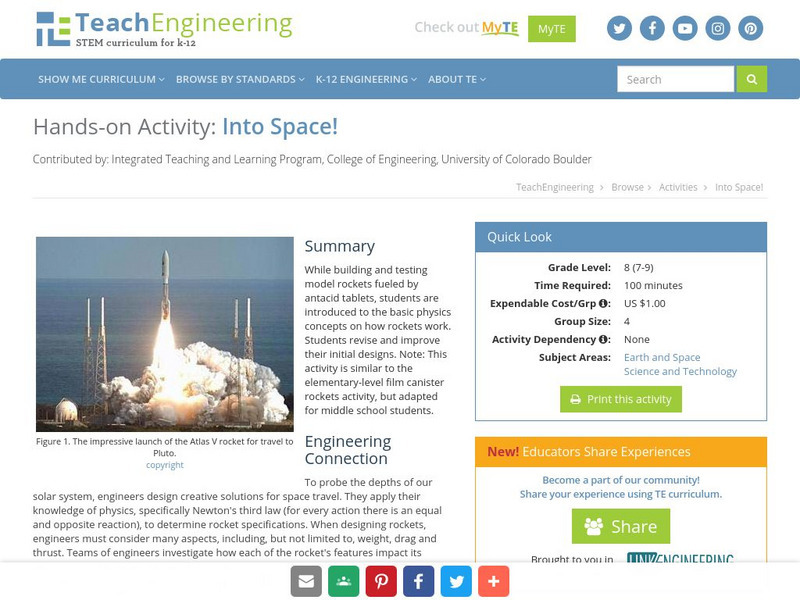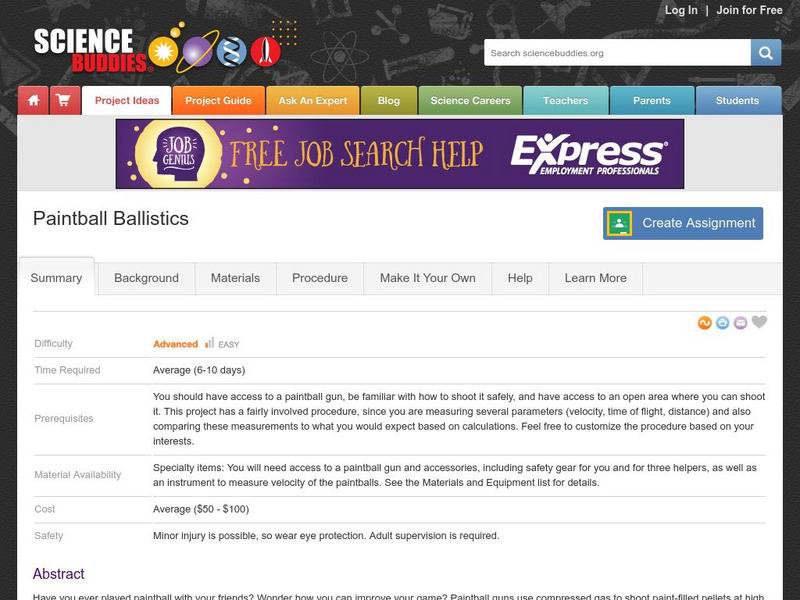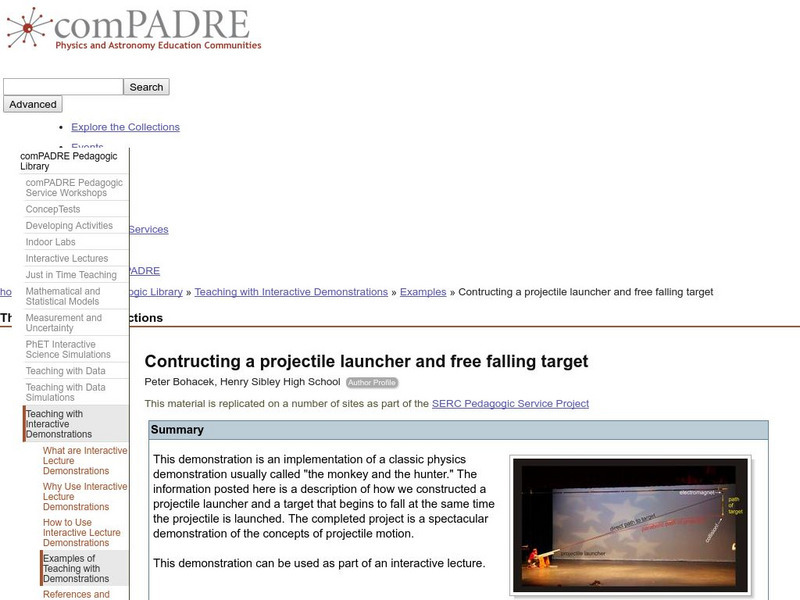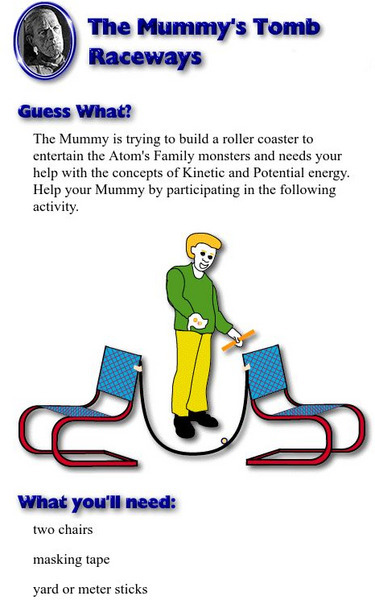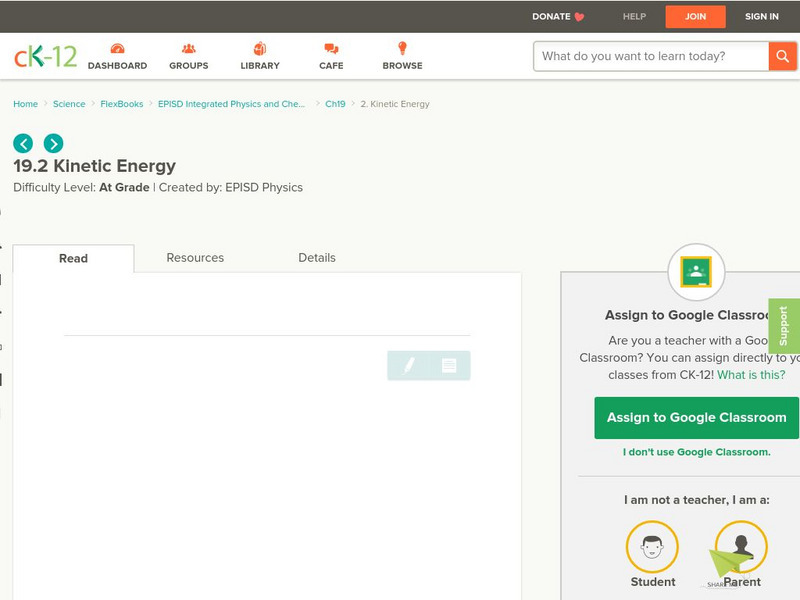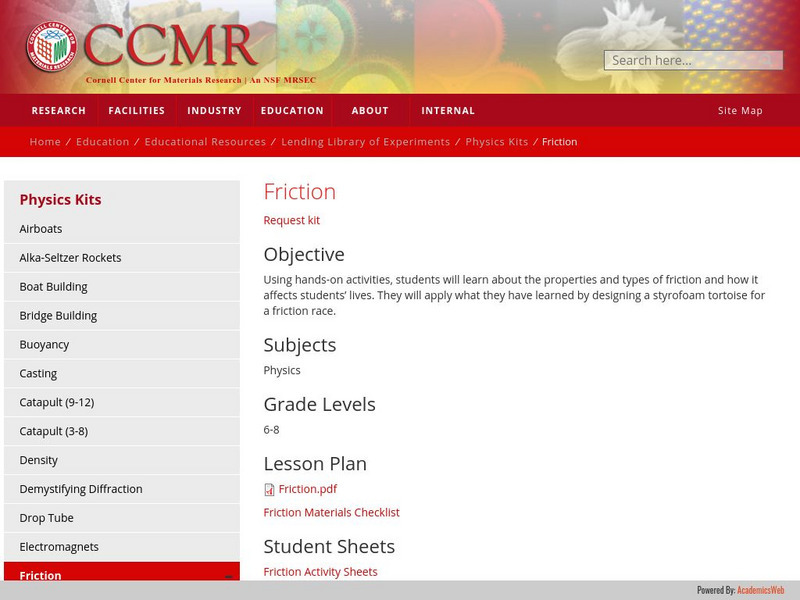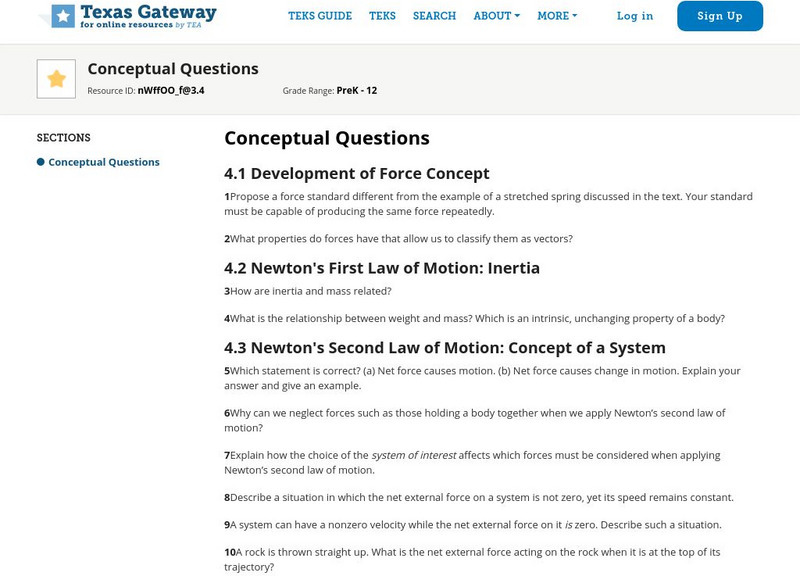Open Curriculum
Open Curriculum: Velocity and Relative Motion
An illustrated article helps physics students learn about center of mass and velocity, and define the concept of inertia.
Khan Academy
Khan Academy: Motion With Constant Acceleration Review
Review the key concepts, equations, and skills for motion with constant acceleration, including how to choose the best kinematic formula for a problem.
Khan Academy
Khan Academy: Uniform Circular Motion and Centripetal Acceleration Review
Review the key concepts, equations, and skills for uniform circular motion, including centripetal acceleration and the difference between linear and angular velocity.
CK-12 Foundation
Ck 12: Physics Simulation: Walk the Tightrope
[Free Registration/Login Required] Understand the concept of rotational inertia [moment of inertia) by analyzing the motion of a circus tightrope walker using this interactive simulation. A PDF worksheet and a video tutorial are also...
Cosmo Learning
Cosmo Learning: Physics 240: Science and Engineering I
A collection of video lectures from a physics for science and engineering course taught at the University of Missouri-Kansas City. The course discusses the concepts of mechanics, wave motion, sound, heat and thermodynamics in thirty-five...
Physics Classroom
The Physics Classroom: Circular and Satellite Motion: Newton's 2nd Law Revisited
In this interactive module, students use free-body diagrams, Newton's second law equation, and circular motion concepts to analyze a variety of physical situations involving the motion of objects in circles or along curved paths.
Physics Classroom
The Physics Classroom: Circular and Satellite Motion: Speed and Velocity
In this interactive module, describe and explain the motion of objects that either move in circles or can be approximated to be moving in circles. Kinematic concepts and motion principles will be applied to the motion of objects in...
Science and Mathematics Initiative for Learning Enhancement (SMILE)
Smile: Periodic Motion, the Pendulum
The Illinois Institute of Technology offers this lesson plan to teach high school learners the concept of periodic motion and relate it to the movement of a pendulum.
Physics Classroom
The Physics Classroom: Waves: Frequency and Period of a Wave
Students are introduced to the concept of frequency as it relates to periodic wave motion.
Physics Classroom
The Physics Classroom: Work, Energy, and Power: Kinetic Energy
Introduce students to the concept of kinetic energy through interactive practice exercises and illustrated examples.
TeachEngineering
Teach Engineering: Into Space!
While building and testing model rockets fueled by antacid tablets, students are introduced to the basic physics concepts on how rockets work. Students revise and improve their initial designs. Note: This activity is similar to the...
Other
Physics Quests
This resource links to many web-based activities which allow students to explore and examine physic principles and concepts on their own. Links to other good physics sites are also here.
Science Buddies
Science Buddies: Project Ideas: Paintball Ballistics
In this science fair project, use a paintball gun to compare the calculated vs. the actual range of a projectile. The Science Buddies project ideas are set up consistently beginning with an abstract, objective, and introduction, followed...
McGraw Hill
Mc Graw Hill Learning Center: Rigid Bodies and Rotational Motion
From the companion web site for the Contemporary College Physics web site. The collection of pages indexed from this page lead to a variety of useful resources pertinent to Chapter 9 (Rigid Bodies and Rotational Motion) of the book. Such...
Annenberg Foundation
Annenberg Learner: Design a Roller Coaster
An interactive lesson where students design and build their own virtual roller coaster. Choose the height of the hills. the shape of the hills. and loop to find out if you successfully used physics concepts to pass the safety and fun...
Science Buddies
Science Buddies: Distance and Constant Acceleration
This project is an experiment in classical physics. You'll be following in Galileo's footsteps, and investigating Newton's laws of motion, using a metronome as your timing device. This resource will help you get a firm understanding of...
Texas Education Agency
Texas Gateway: 4.1 Development of Force Concept
By the end of this section, you will be able to understand the definition of force.
Science Education Resource Center at Carleton College
Serc: Constructing a Projectile Launcher and Free Falling Target
Implement the classic physics demonstration "the monkey and the hunter" using this description of a projectile launcher and a target that begins to fall at the same time the projectile is launched. The completed project is a spectacular...
Open Curriculum
Open Curriculum: Free Waves
With this article, students can learn about and understand the concept of wave motion.
Other
Puhinui School: The Atoms Family: The Mummy's Tomb: Raceways
Help the Mummy build a rollercoaster to entertain the Atoms Family monsters by investigating the concepts of kinetic and potential energy.
CK-12 Foundation
Ck 12: Kinetic Energy
[Free Registration/Login may be required to access all resource tools.] Students explore the concept of energy as well as the idea of energy in motion, kinetic energy.
Cornell University
Cornell University: Cornell Center for Materials Research: Friction
A collection of experiments where learners can learn about how friction works and affects the physical world. At the end, students design a tortoise to win by slowing it down using friction. Lesson includes explanation of the concept of...
Texas Education Agency
Texas Gateway: Force and Newton's Laws: Conceptual Questions
This page offers 27 questions to test students' knowledge of the major concepts in each section of Chapter 4: Dynamics: Force and Newton's Laws of Motion from the AP Physics online text.
American Chemical Society
Middle School Chemistry: Changing State: Melting
Discover the concept that energy transfer and molecular motion cause the change in state from a solid to a liquid. Also compare state changes of water to the state changes of other substances.







